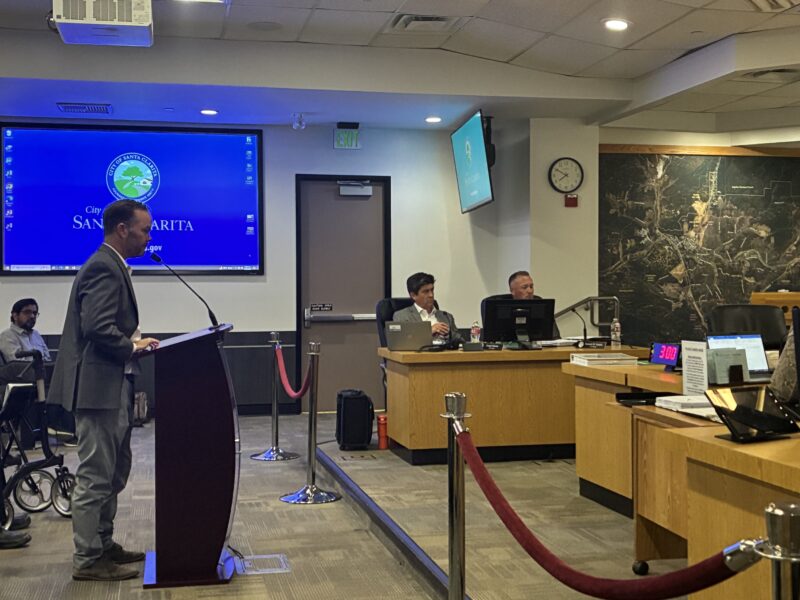Miranda rants against fellow council members, developer and radio station owners over controversial Hartwell mixed-use project; city running scared over potential litigation
Questions about The Hartwell project linger as the Newhall developer, who took a tongue-lashing from the mayor Tuesday over his deal, prepares to pull demolition permits for his buildings.
The three Santa Clarita City Council members who approved the 98-condo project on Main Street said they didn’t feel like they had any options but approval due to state housing laws cited by the city attorney.
The Signal made inquiries Wednesday and Thursday about City Attorney Joe Montes’ legal concerns, which the City Council said was the reason for its approval.
The city declined to make Montes available to answer questions in an interview, instead sharing a written statement.
City officials declined to state why he would not be made available.
The deal was approved with a 3-0 vote after Mayor Pro Tem Laurene Weste and Councilman Jason Gibbs recused themselves due to separate conflicts of interest.
While the project itself was praised by the council members, the entire Hartwell process — the Sacramento blame, congressional campaigning and even corruption allegations — left some not liking “the smell” of things in Newhall.
The deal-making
During his comments Tuesday night, Mayor Bill Miranda criticized Jason Tolleson of Serrano Development Group for making a “stupid deal,” saying he paid too much for the radio station property.
Miranda said the station’s owners, Carl and Jeri Goldman, were getting money above market value for the building, and some of that money should have gone to the city for historical preservation, a previous and now-defunct staff recommendation Miranda had supported.
Tolleson said he definitely wanted to pay less for the building, but that the radio station property was significant to the project, which he needed to get started.
It was an either-or situation, Tolleson said. He didn’t have money for both the city and the radio station.
Miranda said he was expressing frustration at the meeting over months of criticism he received for the May approval, including allegations of a backroom deal by Weste, who privately negotiated the original proposal with Tolleson on the city’s behalf.
The mayor was upset that Carl and Jeri Goldman made allegations against Weste, defending her, saying Weste “has all the facts.”
He said with the new deal in front of him, “I don’t like what I’m smelling,” alluding to corruption.
Miranda said he didn’t know why or how some of the money recommended for historic preservation was left on the table for a building purchase. But he didn’t like it.
And he even asked Tolleson for it back — sort of.
Original deal
The proposal in May included a $750,000 fee for historical preservation to help with the city’s renovation of nearby Hart Park and to protect any elements remaining in a nearly 100-year-old courthouse on Market Street, which has been heavily remodeled since its construction, and is now slated for demolition as part of the project.
The Planning Commission voted to approve the staff recommendation 5-0, including the historic mitigation fee.
Later, Tolleson agreed to pay more than half that amount, $450,000, for “sound mitigation” to the nearby radio station — but the historic preservation fee remained a staff recommendation.
This created a discrepancy for the City Council at the May 13 meeting, as the staff recommendation for the project continued to call for the developer to pay the historic preservation fee in order to get demolition permits.
During that May 13 meeting, Gibbs said that the city staff recommendation “doesn’t match” what Tolleson was requesting of the City Council, “so there does have to be a discussion about potentially changing it,” and asked Tolleson to address that.
Tolleson responded by requesting the reduction of the impact fee, traffic concerns mentioned by Ayala and “to allow for the sound deal with KHTS, that’s what we’re asking for here,” he said at the May meeting, which the council approved.
Gibbs’ motion at that meeting cleared the way for $300,000 of the staff-recommended preservation fee to go to a future parking structure, leaving the remaining $450,000 on the table for a building offer.
Revised deal
One week after the City Council’s May approval of the project, Gibbs accepted more than $1,000 in donations from the Goldmans in support of his effort to run for the 27th Congressional District, according to Miranda on Tuesday.
The following month, the Goldmans came to terms with Tolleson, agreeing to sell the radio station’s Main Street property.
Tolleson’s purchase of 24320 Main St. allowed him to add 20 condo units to his plan, as well as 1,100 more square feet of commercial space, according to plans approved by city staff.
But that development plan required Gibbs’ recusal under conflict-of-interest laws, for which Miranda castigated Gibbs in no uncertain terms.
Miranda called Gibbs “our wannabe congressman” at one point during his lecture Tuesday, adding he couldn’t believe neither the Goldmans nor Gibbs knew better.
Then, Miranda aimed his wrath at Tolleson while putting together the purchase price out loud, claiming a $1.9 million assessed value, yet the final sale price was $2.35 million, a difference of $450,000.
“Why is that?” Miranda asked Tolleson, that he can afford an extra $450,000 over-market for a building, but he could not afford the previously discussed historical mitigation fee in the original staff recommendation.
“It’s one or the other, because that’s …” Tolleson said.
“Well, then why did you choose that one instead of us?” Miranda interrupted.
“We would have been happy to not do that, it was …” Tolleson answered.
“Then why did you do it?” Miranda pressed, which prompted a smile and a pause from Tolleson.
“Because — there was a lot of concern among the community about the fate of KHTS,” he said, trailing off, to which Miranda sharply objected.
“There’s not a lot of concern about the fate of KHTS in the community — there’s no proof of that whatsoever,” Miranda shot back.
“That’s why we did it, that’s why we did it,” Tolleson answered quietly, “so …”
Miranda started again.
“Are you smelling what I’m smelling?” Miranda asked him rhetorically.
“And it’s rich because Carl (Goldman) came over here to this meeting not that long ago and accused us of not being transparent,” Miranda added.
Miranda said he’s been transparent, and he likes the project because it’s good for the city.
But as far as the process that grew the project from a four-story, 51-unit proposal with 3,300 square feet of commercial to a final version nearly twice that size:
“I’m smelling something I don’t like to smell.”
Required approval
When Miranda asked Tolleson to make him feel better about things, Tolleson described what he was trying to do, after previously saying he also was taking care of all the property owners being impacted.
“Everyone but the city,” Miranda said, questioning why the original approval couldn’t have been built at 78 units, with sound mitigation for the radio station and the historic mitigation fee.
Tolleson tried again to explain that he was paying the price because he was no longer paying sound mitigation, which was the only reason he could afford the purchase, alluding to the profit from the additional units.
Miranda then said he still wanted the $750,000 for the city — but he didn’t try to make it a condition of approval for the amendment.
City staff on Tuesday, as well as Montes, repeatedly said that City Council members were somewhat limited in their scope of action under the state’s Housing Accountability Act.
Councilwoman Marsha McLean reiterated her concerns about the parking for the project, which was cited as problematic by numerous residents during both approvals.
The last time she brought up the concerns, she was told the city had failed to notify the developer within 30 days of any problems with its objective standards, which meant the city had to approve the plan.
McLean asked if that was the case, why wasn’t the council given more information the second time around, if the clock restarted with the request to add KHTS, which it did.
Montes said the notice wasn’t the problem, the laws and allowable time were.
The city can require a developer to pay for a traffic study that shows a project has no negative impact, but the city would only have 30 days to either compare the new study with others that area developers have paid for, or check for consistency with “the city’s other methodologies for parking,” which were not explained.
“In my opinion, there was obviously a problem with (parking for) existing businesses, but we didn’t have a chance to look at that,” McLean said. “We didn’t have a chance to say anything, and we didn’t have a chance to speak with the developer to say … that there was a problem,” McLean said. “So how do we fix it?”
Montes said at the meeting the state Legislature “typically doesn’t build means to address local concerns because they don’t care.”
Carrie Lujan, communications manager for the city, sent the following statement after indicating the city attorney would not be made available to answer any questions:
“The expansion met all of the city’s objective standards. As a result, the city must approve the project under the Housing Accountability Act, unless the city can prove there is a specific adverse impact upon the public health or safety based upon objective, identified written health or safety standards, policies or conditions as they existed on the date the application was deemed complete. No such specific adverse impacts were identified.”
On Thursday, city officials shared a threat letter the city had received from the California Housing Defense Fund, an Oakland-based nonprofit “whose mission includes advocating for increased access to housing for Californians at all income levels, including low-income households,” according to the letter.
“While no one project will solve the statewide housing crisis,” the letter states, “the proposed development is a step in the right direction. CalHDF urges the city to approve it, consistent with its obligations under state law.”








